Dr. David Tucker
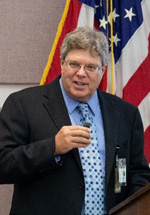 His career spans research and scientific successes in industry, academia, and the government sectors. At NETL, Dr. Tucker serves as the Hybrid Performance (Hyper) project leader with research focus in cyber-physical systems, hardware-in-the-loop simulations, real-time dynamic modeling, hybrid system dynamics and controls, solid oxide fuel cell degradation, piezoelectric flow detection, high-temperature piezoelectric valves, and cyber-security using blockchain. During his tenure at NETL, Dr. Tucker developed a cyber-physical system for energy research six years before the National Science Foundation coined the term in 2008. Cyber-physical systems embody a seamless integration of hardware and numeric models that interact with a physical environment and form the foundation of intelligent systems. Using the cyber-physical approach, Dr. Tucker explored the capability of hybrid systems to maintain high efficiencies at part-load conditions and to make fast transitions to accommodate the load following required for increased penetration of intermittent renewable resources on the grid. At Jacobs Engineering Group, Dr. Tucker served as a lead engineer in piping and materials engineering on a $7.1B refinery expansion project. He taught at the University of West Alabama as a chemistry professor, performing research in the flash pyrolysis of waste biomass in high temperature plasma. As Managing Director for Southern Ventures, Inc., Dr. Tucker took the company public and led corporate direction for zero-emission conversion of waste materials into chemical products.
His career spans research and scientific successes in industry, academia, and the government sectors. At NETL, Dr. Tucker serves as the Hybrid Performance (Hyper) project leader with research focus in cyber-physical systems, hardware-in-the-loop simulations, real-time dynamic modeling, hybrid system dynamics and controls, solid oxide fuel cell degradation, piezoelectric flow detection, high-temperature piezoelectric valves, and cyber-security using blockchain. During his tenure at NETL, Dr. Tucker developed a cyber-physical system for energy research six years before the National Science Foundation coined the term in 2008. Cyber-physical systems embody a seamless integration of hardware and numeric models that interact with a physical environment and form the foundation of intelligent systems. Using the cyber-physical approach, Dr. Tucker explored the capability of hybrid systems to maintain high efficiencies at part-load conditions and to make fast transitions to accommodate the load following required for increased penetration of intermittent renewable resources on the grid. At Jacobs Engineering Group, Dr. Tucker served as a lead engineer in piping and materials engineering on a $7.1B refinery expansion project. He taught at the University of West Alabama as a chemistry professor, performing research in the flash pyrolysis of waste biomass in high temperature plasma. As Managing Director for Southern Ventures, Inc., Dr. Tucker took the company public and led corporate direction for zero-emission conversion of waste materials into chemical products.
Return
Dr. Nana Zhou
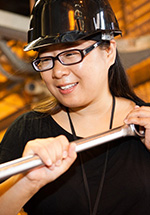 Nana Zhou has a Ph.D. degree in Power Engineering. She has 10+ years research experience in integrated energy systems, advanced controls, mechanical designs, hardware-in-the-loop simulations, and cyber-physical systems. Currently her research focuses on thermal energy storage, carbon capture and cyber-physical conceptual designs. As recognition of her education contributions, she has been a research advisor to 30+ undergraduate and graduate students. Her optimism and easily approachable manner resulted in positive experiences for both interns and hosts. In addition, she organized several technical forums and international workshops, which drew an attendance of more than 300 domestic and international researchers and administrators from universities, national labs, industrials, and government.
Nana Zhou has a Ph.D. degree in Power Engineering. She has 10+ years research experience in integrated energy systems, advanced controls, mechanical designs, hardware-in-the-loop simulations, and cyber-physical systems. Currently her research focuses on thermal energy storage, carbon capture and cyber-physical conceptual designs. As recognition of her education contributions, she has been a research advisor to 30+ undergraduate and graduate students. Her optimism and easily approachable manner resulted in positive experiences for both interns and hosts. In addition, she organized several technical forums and international workshops, which drew an attendance of more than 300 domestic and international researchers and administrators from universities, national labs, industrials, and government.
Return
Dr. Biao Zhang
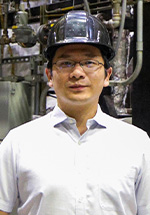 Dr. Biao Zhang has been a researcher at the U.S. DOE NETL since 2019. His research at NETL mainly focuses on the grid demand response of hybrid energy systems and cyber-physical simulation of solid oxide cells (SOFC/SOEC)-based hybrid energy systems. Prior to joining NETL, Biao was an assistant professor at Chongqing University, China with the research area in the transport phenomena in micro-fuel cells and micro-reactors. He also explored the microfluidic approaches for biomedical applications at the University of Toronto in his post-doc training there. Dr. Biao Zhang has diverse expertise and experience in experimental and computational investigation of heat and mass transfer in electrochemical energy conversion. He has authored and co-authored 68 journal papers with an H-index of 23.
Dr. Biao Zhang has been a researcher at the U.S. DOE NETL since 2019. His research at NETL mainly focuses on the grid demand response of hybrid energy systems and cyber-physical simulation of solid oxide cells (SOFC/SOEC)-based hybrid energy systems. Prior to joining NETL, Biao was an assistant professor at Chongqing University, China with the research area in the transport phenomena in micro-fuel cells and micro-reactors. He also explored the microfluidic approaches for biomedical applications at the University of Toronto in his post-doc training there. Dr. Biao Zhang has diverse expertise and experience in experimental and computational investigation of heat and mass transfer in electrochemical energy conversion. He has authored and co-authored 68 journal papers with an H-index of 23.
Return
Dr. Nor Farida Harun
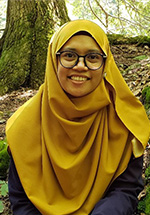 Dr. Nor Farida Harun is currently a scientist with Leidos, Inc. at the U.S. Department of Energy, National Energy Technology Laboratory in Morgantown, WV. She earned a Ph.D. in Chemical Engineering from McMaster University, Ontario, Canada. Her PhD thesis was on fuel flexibility, exploring the opportunities and the challenges for solid oxide fuel cell gas turbine hybrid systems. Her research interest is in integrated energy systems for resiliency, flexibility, and grid stability that couple mature technologies like recuperated gas turbine cycle with new technologies, including solid oxide fuel cell, solid oxide electrolyzer, thermal energy storage systems as well as renewable energy systems. As part of her work, Dr. Harun also conducts R&D in system characterization and dynamic control development for energy systems using real-time dynamic simulations and cyber-physical test facility (i.e., hardware-based system at a pilot scale). With more than 10 years of experience working on numerous projects, Dr. Harun has been recognized as a leading international expert in cyber-physical simulation (CPS) systems that creates an opportunity to accelerate the deployment of novel energy systems by providing a reconfigurable hardware simulation platform.
Dr. Nor Farida Harun is currently a scientist with Leidos, Inc. at the U.S. Department of Energy, National Energy Technology Laboratory in Morgantown, WV. She earned a Ph.D. in Chemical Engineering from McMaster University, Ontario, Canada. Her PhD thesis was on fuel flexibility, exploring the opportunities and the challenges for solid oxide fuel cell gas turbine hybrid systems. Her research interest is in integrated energy systems for resiliency, flexibility, and grid stability that couple mature technologies like recuperated gas turbine cycle with new technologies, including solid oxide fuel cell, solid oxide electrolyzer, thermal energy storage systems as well as renewable energy systems. As part of her work, Dr. Harun also conducts R&D in system characterization and dynamic control development for energy systems using real-time dynamic simulations and cyber-physical test facility (i.e., hardware-based system at a pilot scale). With more than 10 years of experience working on numerous projects, Dr. Harun has been recognized as a leading international expert in cyber-physical simulation (CPS) systems that creates an opportunity to accelerate the deployment of novel energy systems by providing a reconfigurable hardware simulation platform.
Return
Danylo Oryshchyn:
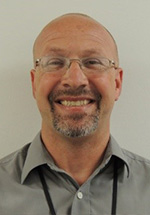 Danylo Oryshchyn is a Mechanical Engineer Research on NETL’s Advanced Systems Integration team. His current work is concentrated in two areas: Experimental Investigation of Direct Power Extraction from combustion plasmas via magnetic fields (magnetohydrodynamics, or MHD) and System Modeling of Hybrid Power Generators. Dan has been with NETL for 20 years and has several patents in CO2 capture. His interests outside energy science include cooking, drawing, and music.
Danylo Oryshchyn is a Mechanical Engineer Research on NETL’s Advanced Systems Integration team. His current work is concentrated in two areas: Experimental Investigation of Direct Power Extraction from combustion plasmas via magnetic fields (magnetohydrodynamics, or MHD) and System Modeling of Hybrid Power Generators. Dan has been with NETL for 20 years and has several patents in CO2 capture. His interests outside energy science include cooking, drawing, and music.
Return
Jose Javier Colon Rodriguez
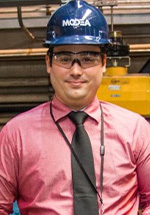 José is currently a Hispanic researcher supporting the U.S. Department of Energy (DOE) programs through Leidos (West Virginia University Research Corporation). José significantly contributed to awards made to NETL by the Advanced Research Projects Agency- Energy (ARPA-E) under the Innovative Natural-gas Technologies for Efficiency Gain in Reliable and Affordable Thermochemical Electricity-generation (INTEGRATE) program. He has mentored students in the CIESESE, Consortium for Hybrid Resilient Energy Systems (CHRES), Mickey Leland Energy Fellowship (MLEF), and ORISE programs as a research advisor and contributed to five different projects at NETL (ARPA-E INTEGRATE, CIESESE, Advanced Sensors and Controls Field Work Proposal Task 51, MLEF, and CHRES). His work focuses on parametric system analysis of SOFC/ICE hybrids, design of an automated SOFC/GT hybrid and cyber-physical reformer, and long-term evaluation of degradation as a function of operating parameters. As a result of Jose’s efforts to increase diversity, he was awarded the prestigious award “Most Promising Scientist or Engineer” under the Great Minds in STEM, Hispanic Engineer National Achievement Awards Corporation (HENAAC) Awards. In 2017, José participated in the Consortium for Integrating Energy Systems in Engineering & Science Education (CIESESE) program summer internship program through the National Nuclear Security Agency’s (NNSA) Minority Serving Institution Partnership Program (MSIPP).
José is currently a Hispanic researcher supporting the U.S. Department of Energy (DOE) programs through Leidos (West Virginia University Research Corporation). José significantly contributed to awards made to NETL by the Advanced Research Projects Agency- Energy (ARPA-E) under the Innovative Natural-gas Technologies for Efficiency Gain in Reliable and Affordable Thermochemical Electricity-generation (INTEGRATE) program. He has mentored students in the CIESESE, Consortium for Hybrid Resilient Energy Systems (CHRES), Mickey Leland Energy Fellowship (MLEF), and ORISE programs as a research advisor and contributed to five different projects at NETL (ARPA-E INTEGRATE, CIESESE, Advanced Sensors and Controls Field Work Proposal Task 51, MLEF, and CHRES). His work focuses on parametric system analysis of SOFC/ICE hybrids, design of an automated SOFC/GT hybrid and cyber-physical reformer, and long-term evaluation of degradation as a function of operating parameters. As a result of Jose’s efforts to increase diversity, he was awarded the prestigious award “Most Promising Scientist or Engineer” under the Great Minds in STEM, Hispanic Engineer National Achievement Awards Corporation (HENAAC) Awards. In 2017, José participated in the Consortium for Integrating Energy Systems in Engineering & Science Education (CIESESE) program summer internship program through the National Nuclear Security Agency’s (NNSA) Minority Serving Institution Partnership Program (MSIPP).
Return
Dr. Sam Bayham
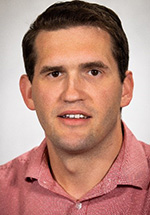 Dr. Sam Bayham is research engineer at the National Energy Technology Laboratory in Morgantown, West Virginia, studying novel combustion and gasification technologies for clean fossil energy conversion. His work involves performing experiments using basic modeling approaches to assess the feasibility and aid in the maturation of novel technologies. He started his career studying chemical looping combustion, which uses a metal oxide material to oxidize fuel instead of molecular oxygen, and he has coauthored over twenty papers on the subject related to small scale laboratory and pilot scale experiments. Sam studies novel power cycles that integrate fuel cells, gas turbines and combustion engines together for further efficiency gains. In addition to program responsibilities, Sam is passionate about innovation and technology transfer and has been involved in several DOE/NETL lab initiatives promoting innovation activities among staff researchers. He also spends time with outreach and education for the lab, assisting collaboration with labs and research universities in Taiwan. He volunteers as a moderator for DOE's Science Bowl and teaches STEM workshops. He obtained his bachelors, masters, and doctoral degrees in Chemical Engineering from the Ohio State University with a background in multiphase flows, reaction kinetics, heat transfer and thermodynamics, particularly related to novel reactor designs and process intensification.
Dr. Sam Bayham is research engineer at the National Energy Technology Laboratory in Morgantown, West Virginia, studying novel combustion and gasification technologies for clean fossil energy conversion. His work involves performing experiments using basic modeling approaches to assess the feasibility and aid in the maturation of novel technologies. He started his career studying chemical looping combustion, which uses a metal oxide material to oxidize fuel instead of molecular oxygen, and he has coauthored over twenty papers on the subject related to small scale laboratory and pilot scale experiments. Sam studies novel power cycles that integrate fuel cells, gas turbines and combustion engines together for further efficiency gains. In addition to program responsibilities, Sam is passionate about innovation and technology transfer and has been involved in several DOE/NETL lab initiatives promoting innovation activities among staff researchers. He also spends time with outreach and education for the lab, assisting collaboration with labs and research universities in Taiwan. He volunteers as a moderator for DOE's Science Bowl and teaches STEM workshops. He obtained his bachelors, masters, and doctoral degrees in Chemical Engineering from the Ohio State University with a background in multiphase flows, reaction kinetics, heat transfer and thermodynamics, particularly related to novel reactor designs and process intensification.
Return




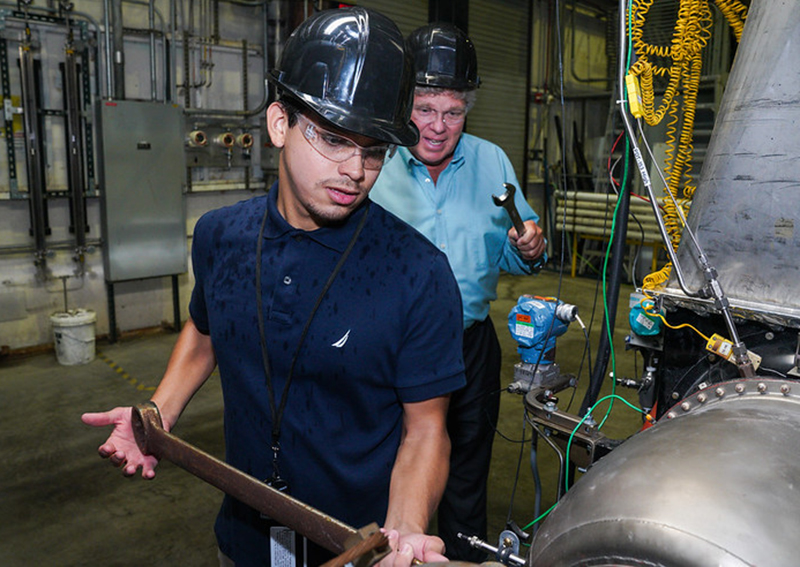
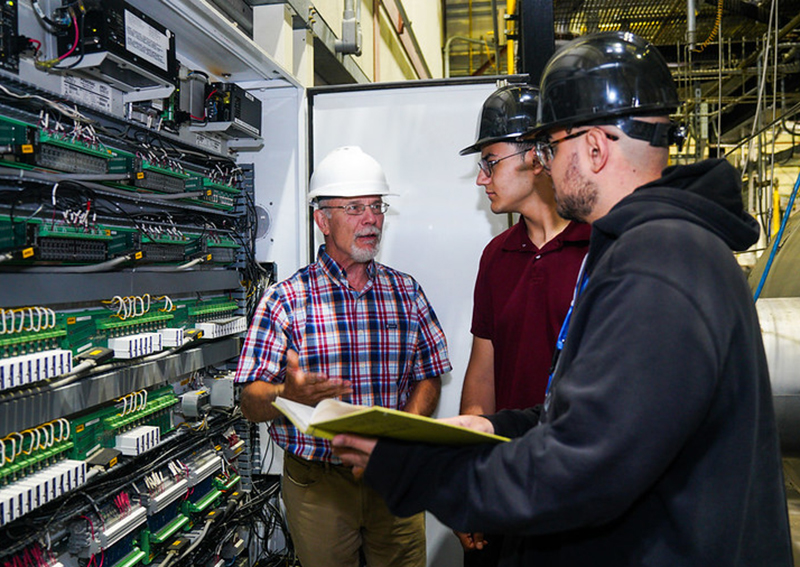
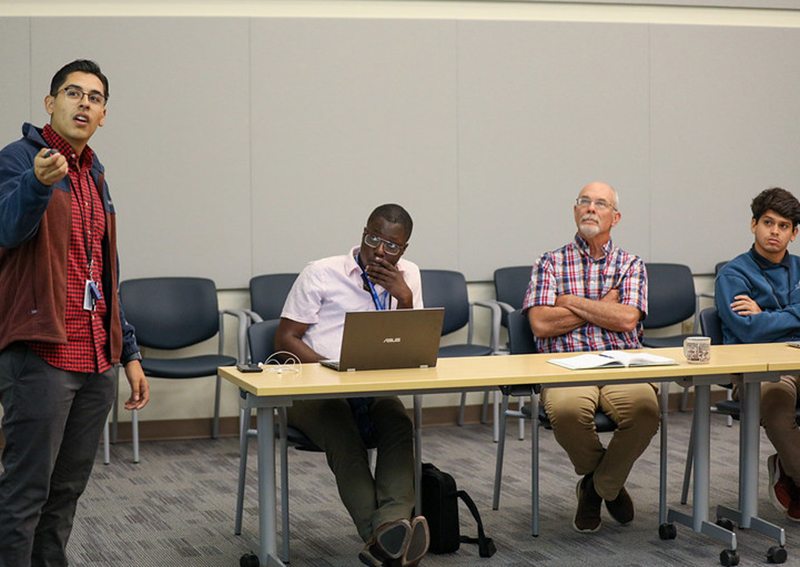
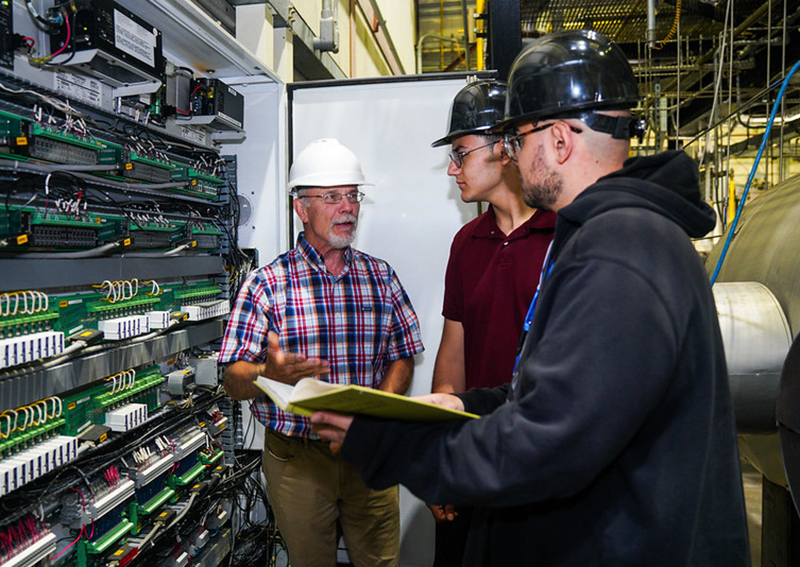
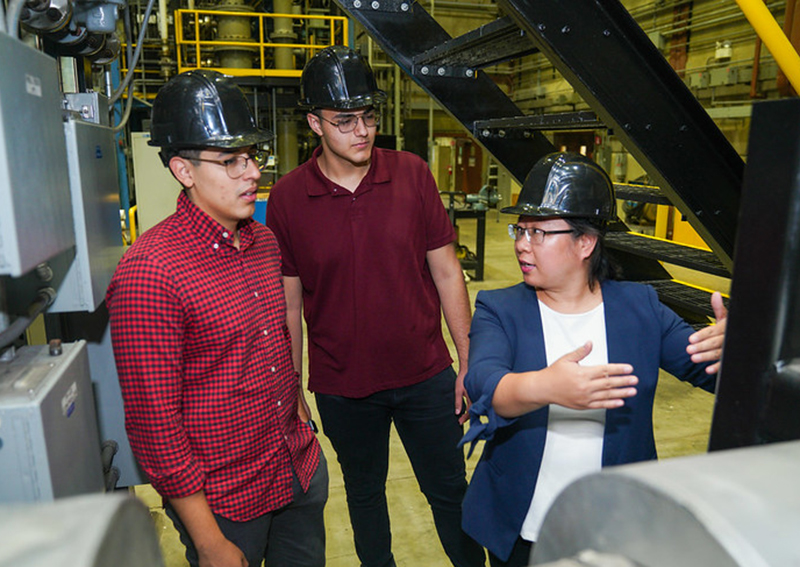
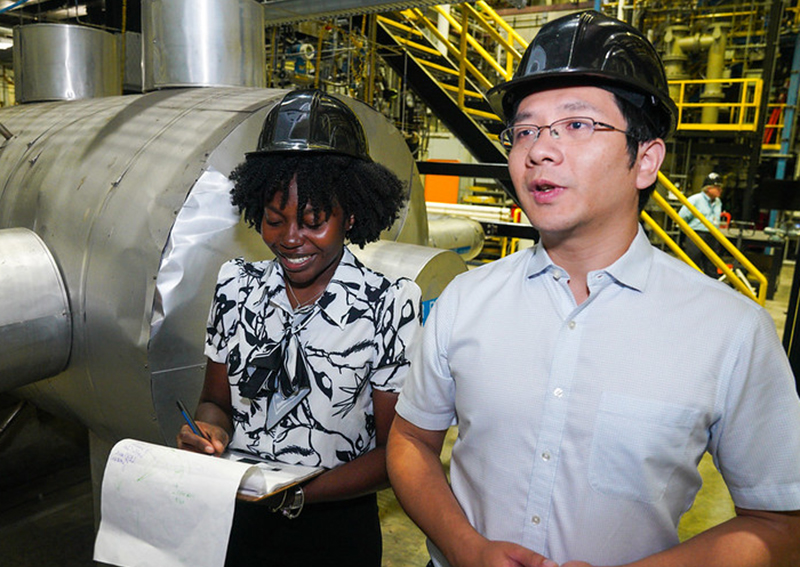
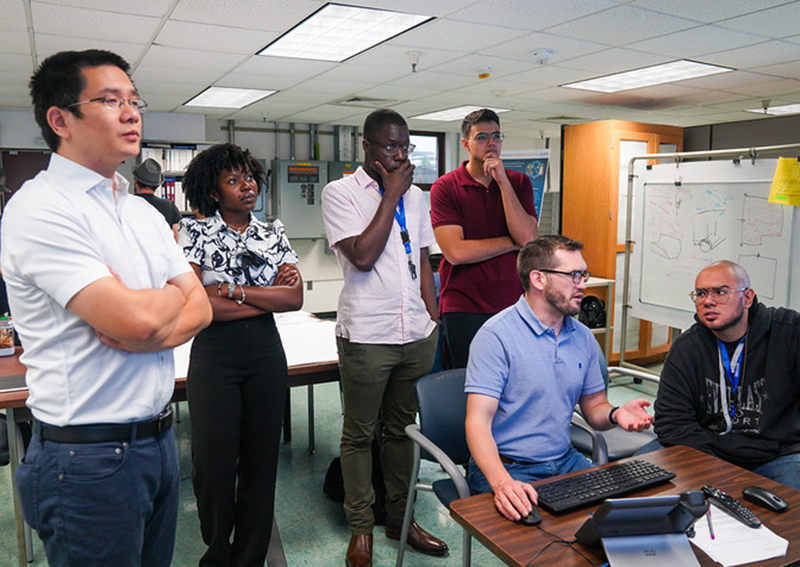
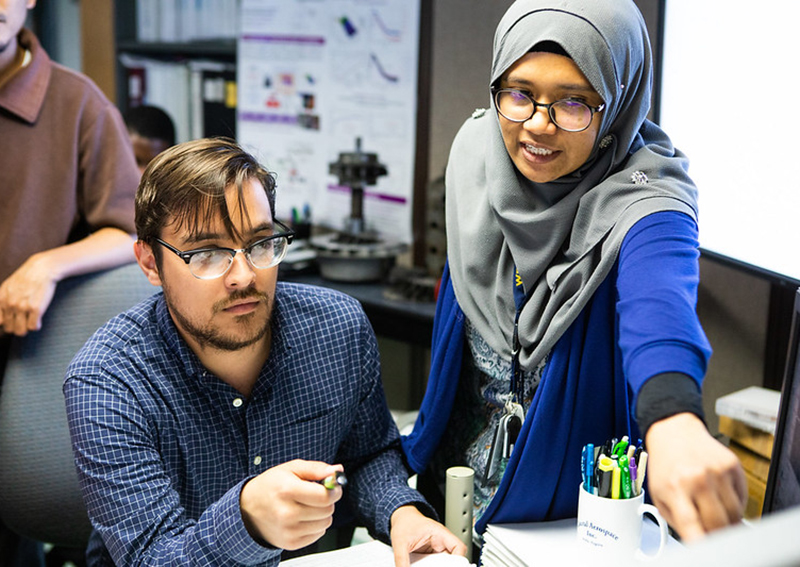
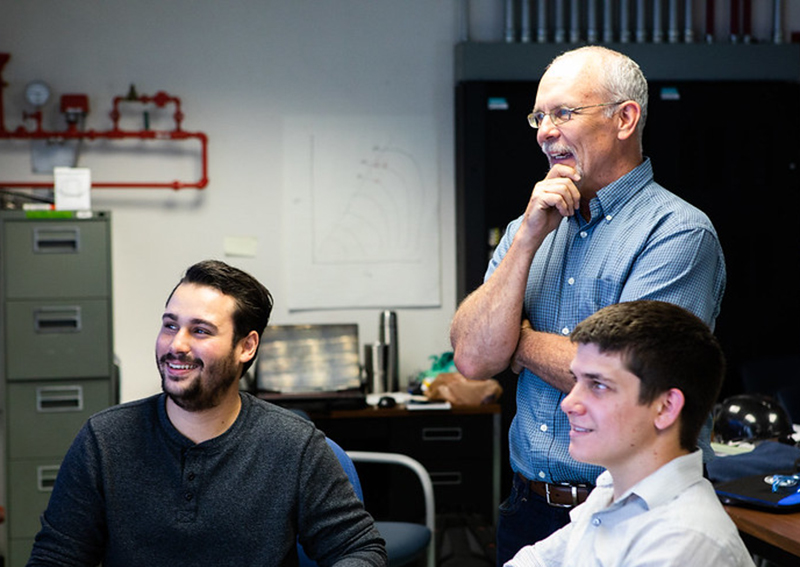
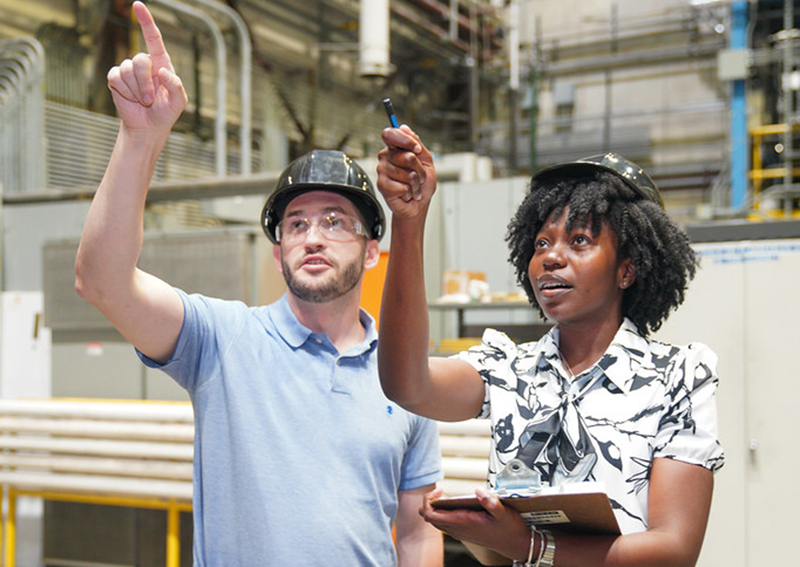
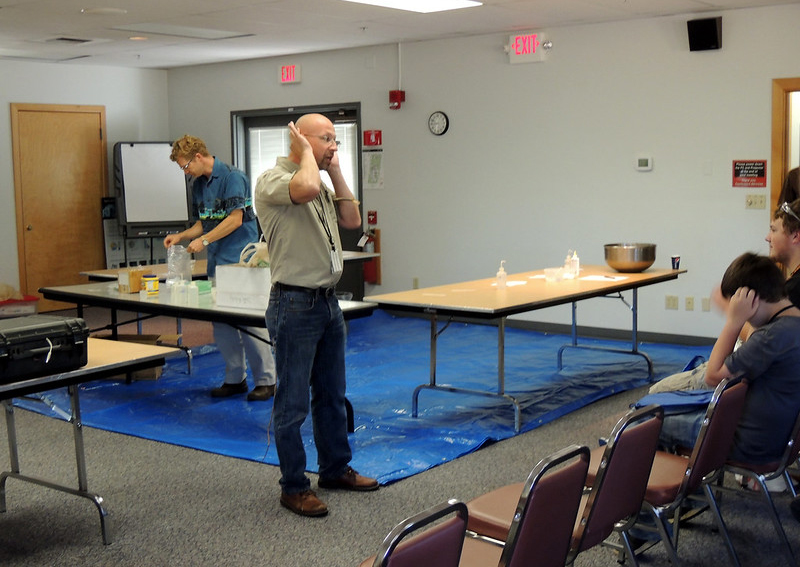
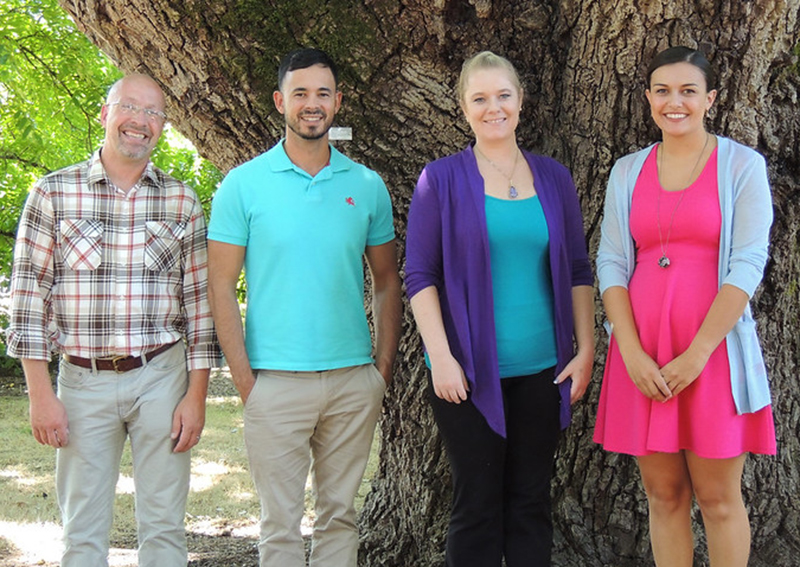
 His career spans research and scientific successes in industry, academia, and the government sectors. At NETL, Dr. Tucker serves as the Hybrid Performance (Hyper) project leader with research focus in cyber-physical systems, hardware-in-the-loop simulations, real-time dynamic modeling, hybrid system dynamics and controls, solid oxide fuel cell degradation, piezoelectric flow detection, high-temperature piezoelectric valves, and cyber-security using blockchain. During his tenure at NETL, Dr. Tucker developed a cyber-physical system for energy research six years before the National Science Foundation coined the term in 2008. Cyber-physical systems embody a seamless integration of hardware and numeric models that interact with a physical environment and form the foundation of intelligent systems. Using the cyber-physical approach, Dr. Tucker explored the capability of hybrid systems to maintain high efficiencies at part-load conditions and to make fast transitions to accommodate the load following required for increased penetration of intermittent renewable resources on the grid. At Jacobs Engineering Group, Dr. Tucker served as a lead engineer in piping and materials engineering on a $7.1B refinery expansion project. He taught at the University of West Alabama as a chemistry professor, performing research in the flash pyrolysis of waste biomass in high temperature plasma. As Managing Director for Southern Ventures, Inc., Dr. Tucker took the company public and led corporate direction for zero-emission conversion of waste materials into chemical products.
His career spans research and scientific successes in industry, academia, and the government sectors. At NETL, Dr. Tucker serves as the Hybrid Performance (Hyper) project leader with research focus in cyber-physical systems, hardware-in-the-loop simulations, real-time dynamic modeling, hybrid system dynamics and controls, solid oxide fuel cell degradation, piezoelectric flow detection, high-temperature piezoelectric valves, and cyber-security using blockchain. During his tenure at NETL, Dr. Tucker developed a cyber-physical system for energy research six years before the National Science Foundation coined the term in 2008. Cyber-physical systems embody a seamless integration of hardware and numeric models that interact with a physical environment and form the foundation of intelligent systems. Using the cyber-physical approach, Dr. Tucker explored the capability of hybrid systems to maintain high efficiencies at part-load conditions and to make fast transitions to accommodate the load following required for increased penetration of intermittent renewable resources on the grid. At Jacobs Engineering Group, Dr. Tucker served as a lead engineer in piping and materials engineering on a $7.1B refinery expansion project. He taught at the University of West Alabama as a chemistry professor, performing research in the flash pyrolysis of waste biomass in high temperature plasma. As Managing Director for Southern Ventures, Inc., Dr. Tucker took the company public and led corporate direction for zero-emission conversion of waste materials into chemical products. Nana Zhou has a Ph.D. degree in Power Engineering. She has 10+ years research experience in integrated energy systems, advanced controls, mechanical designs, hardware-in-the-loop simulations, and cyber-physical systems. Currently her research focuses on thermal energy storage, carbon capture and cyber-physical conceptual designs. As recognition of her education contributions, she has been a research advisor to 30+ undergraduate and graduate students. Her optimism and easily approachable manner resulted in positive experiences for both interns and hosts. In addition, she organized several technical forums and international workshops, which drew an attendance of more than 300 domestic and international researchers and administrators from universities, national labs, industrials, and government.
Nana Zhou has a Ph.D. degree in Power Engineering. She has 10+ years research experience in integrated energy systems, advanced controls, mechanical designs, hardware-in-the-loop simulations, and cyber-physical systems. Currently her research focuses on thermal energy storage, carbon capture and cyber-physical conceptual designs. As recognition of her education contributions, she has been a research advisor to 30+ undergraduate and graduate students. Her optimism and easily approachable manner resulted in positive experiences for both interns and hosts. In addition, she organized several technical forums and international workshops, which drew an attendance of more than 300 domestic and international researchers and administrators from universities, national labs, industrials, and government. Dr. Biao Zhang has been a researcher at the U.S. DOE NETL since 2019. His research at NETL mainly focuses on the grid demand response of hybrid energy systems and cyber-physical simulation of solid oxide cells (SOFC/SOEC)-based hybrid energy systems. Prior to joining NETL, Biao was an assistant professor at Chongqing University, China with the research area in the transport phenomena in micro-fuel cells and micro-reactors. He also explored the microfluidic approaches for biomedical applications at the University of Toronto in his post-doc training there. Dr. Biao Zhang has diverse expertise and experience in experimental and computational investigation of heat and mass transfer in electrochemical energy conversion. He has authored and co-authored 68 journal papers with an H-index of 23.
Dr. Biao Zhang has been a researcher at the U.S. DOE NETL since 2019. His research at NETL mainly focuses on the grid demand response of hybrid energy systems and cyber-physical simulation of solid oxide cells (SOFC/SOEC)-based hybrid energy systems. Prior to joining NETL, Biao was an assistant professor at Chongqing University, China with the research area in the transport phenomena in micro-fuel cells and micro-reactors. He also explored the microfluidic approaches for biomedical applications at the University of Toronto in his post-doc training there. Dr. Biao Zhang has diverse expertise and experience in experimental and computational investigation of heat and mass transfer in electrochemical energy conversion. He has authored and co-authored 68 journal papers with an H-index of 23. Dr. Nor Farida Harun is currently a scientist with Leidos, Inc. at the U.S. Department of Energy, National Energy Technology Laboratory in Morgantown, WV. She earned a Ph.D. in Chemical Engineering from McMaster University, Ontario, Canada. Her PhD thesis was on fuel flexibility, exploring the opportunities and the challenges for solid oxide fuel cell gas turbine hybrid systems. Her research interest is in integrated energy systems for resiliency, flexibility, and grid stability that couple mature technologies like recuperated gas turbine cycle with new technologies, including solid oxide fuel cell, solid oxide electrolyzer, thermal energy storage systems as well as renewable energy systems. As part of her work, Dr. Harun also conducts R&D in system characterization and dynamic control development for energy systems using real-time dynamic simulations and cyber-physical test facility (i.e., hardware-based system at a pilot scale). With more than 10 years of experience working on numerous projects, Dr. Harun has been recognized as a leading international expert in cyber-physical simulation (CPS) systems that creates an opportunity to accelerate the deployment of novel energy systems by providing a reconfigurable hardware simulation platform.
Dr. Nor Farida Harun is currently a scientist with Leidos, Inc. at the U.S. Department of Energy, National Energy Technology Laboratory in Morgantown, WV. She earned a Ph.D. in Chemical Engineering from McMaster University, Ontario, Canada. Her PhD thesis was on fuel flexibility, exploring the opportunities and the challenges for solid oxide fuel cell gas turbine hybrid systems. Her research interest is in integrated energy systems for resiliency, flexibility, and grid stability that couple mature technologies like recuperated gas turbine cycle with new technologies, including solid oxide fuel cell, solid oxide electrolyzer, thermal energy storage systems as well as renewable energy systems. As part of her work, Dr. Harun also conducts R&D in system characterization and dynamic control development for energy systems using real-time dynamic simulations and cyber-physical test facility (i.e., hardware-based system at a pilot scale). With more than 10 years of experience working on numerous projects, Dr. Harun has been recognized as a leading international expert in cyber-physical simulation (CPS) systems that creates an opportunity to accelerate the deployment of novel energy systems by providing a reconfigurable hardware simulation platform. Danylo Oryshchyn is a Mechanical Engineer Research on NETL’s Advanced Systems Integration team. His current work is concentrated in two areas: Experimental Investigation of Direct Power Extraction from combustion plasmas via magnetic fields (magnetohydrodynamics, or MHD) and System Modeling of Hybrid Power Generators. Dan has been with NETL for 20 years and has several patents in CO2 capture. His interests outside energy science include cooking, drawing, and music.
Danylo Oryshchyn is a Mechanical Engineer Research on NETL’s Advanced Systems Integration team. His current work is concentrated in two areas: Experimental Investigation of Direct Power Extraction from combustion plasmas via magnetic fields (magnetohydrodynamics, or MHD) and System Modeling of Hybrid Power Generators. Dan has been with NETL for 20 years and has several patents in CO2 capture. His interests outside energy science include cooking, drawing, and music. José is currently a Hispanic researcher supporting the U.S. Department of Energy (DOE) programs through Leidos (West Virginia University Research Corporation). José significantly contributed to awards made to NETL by the Advanced Research Projects Agency- Energy (ARPA-E) under the Innovative Natural-gas Technologies for Efficiency Gain in Reliable and Affordable Thermochemical Electricity-generation (INTEGRATE) program. He has mentored students in the CIESESE, Consortium for Hybrid Resilient Energy Systems (CHRES), Mickey Leland Energy Fellowship (MLEF), and ORISE programs as a research advisor and contributed to five different projects at NETL (ARPA-E INTEGRATE, CIESESE, Advanced Sensors and Controls Field Work Proposal Task 51, MLEF, and CHRES). His work focuses on parametric system analysis of SOFC/ICE hybrids, design of an automated SOFC/GT hybrid and cyber-physical reformer, and long-term evaluation of degradation as a function of operating parameters. As a result of Jose’s efforts to increase diversity, he was awarded the prestigious award “Most Promising Scientist or Engineer” under the Great Minds in STEM, Hispanic Engineer National Achievement Awards Corporation (HENAAC) Awards. In 2017, José participated in the Consortium for Integrating Energy Systems in Engineering & Science Education (CIESESE) program summer internship program through the National Nuclear Security Agency’s (NNSA) Minority Serving Institution Partnership Program (MSIPP).
José is currently a Hispanic researcher supporting the U.S. Department of Energy (DOE) programs through Leidos (West Virginia University Research Corporation). José significantly contributed to awards made to NETL by the Advanced Research Projects Agency- Energy (ARPA-E) under the Innovative Natural-gas Technologies for Efficiency Gain in Reliable and Affordable Thermochemical Electricity-generation (INTEGRATE) program. He has mentored students in the CIESESE, Consortium for Hybrid Resilient Energy Systems (CHRES), Mickey Leland Energy Fellowship (MLEF), and ORISE programs as a research advisor and contributed to five different projects at NETL (ARPA-E INTEGRATE, CIESESE, Advanced Sensors and Controls Field Work Proposal Task 51, MLEF, and CHRES). His work focuses on parametric system analysis of SOFC/ICE hybrids, design of an automated SOFC/GT hybrid and cyber-physical reformer, and long-term evaluation of degradation as a function of operating parameters. As a result of Jose’s efforts to increase diversity, he was awarded the prestigious award “Most Promising Scientist or Engineer” under the Great Minds in STEM, Hispanic Engineer National Achievement Awards Corporation (HENAAC) Awards. In 2017, José participated in the Consortium for Integrating Energy Systems in Engineering & Science Education (CIESESE) program summer internship program through the National Nuclear Security Agency’s (NNSA) Minority Serving Institution Partnership Program (MSIPP).  Dr. Sam Bayham is research engineer at the National Energy Technology Laboratory in Morgantown, West Virginia, studying novel combustion and gasification technologies for clean fossil energy conversion. His work involves performing experiments using basic modeling approaches to assess the feasibility and aid in the maturation of novel technologies. He started his career studying chemical looping combustion, which uses a metal oxide material to oxidize fuel instead of molecular oxygen, and he has coauthored over twenty papers on the subject related to small scale laboratory and pilot scale experiments. Sam studies novel power cycles that integrate fuel cells, gas turbines and combustion engines together for further efficiency gains. In addition to program responsibilities, Sam is passionate about innovation and technology transfer and has been involved in several DOE/NETL lab initiatives promoting innovation activities among staff researchers. He also spends time with outreach and education for the lab, assisting collaboration with labs and research universities in Taiwan. He volunteers as a moderator for DOE's Science Bowl and teaches STEM workshops. He obtained his bachelors, masters, and doctoral degrees in Chemical Engineering from the Ohio State University with a background in multiphase flows, reaction kinetics, heat transfer and thermodynamics, particularly related to novel reactor designs and process intensification.
Dr. Sam Bayham is research engineer at the National Energy Technology Laboratory in Morgantown, West Virginia, studying novel combustion and gasification technologies for clean fossil energy conversion. His work involves performing experiments using basic modeling approaches to assess the feasibility and aid in the maturation of novel technologies. He started his career studying chemical looping combustion, which uses a metal oxide material to oxidize fuel instead of molecular oxygen, and he has coauthored over twenty papers on the subject related to small scale laboratory and pilot scale experiments. Sam studies novel power cycles that integrate fuel cells, gas turbines and combustion engines together for further efficiency gains. In addition to program responsibilities, Sam is passionate about innovation and technology transfer and has been involved in several DOE/NETL lab initiatives promoting innovation activities among staff researchers. He also spends time with outreach and education for the lab, assisting collaboration with labs and research universities in Taiwan. He volunteers as a moderator for DOE's Science Bowl and teaches STEM workshops. He obtained his bachelors, masters, and doctoral degrees in Chemical Engineering from the Ohio State University with a background in multiphase flows, reaction kinetics, heat transfer and thermodynamics, particularly related to novel reactor designs and process intensification.